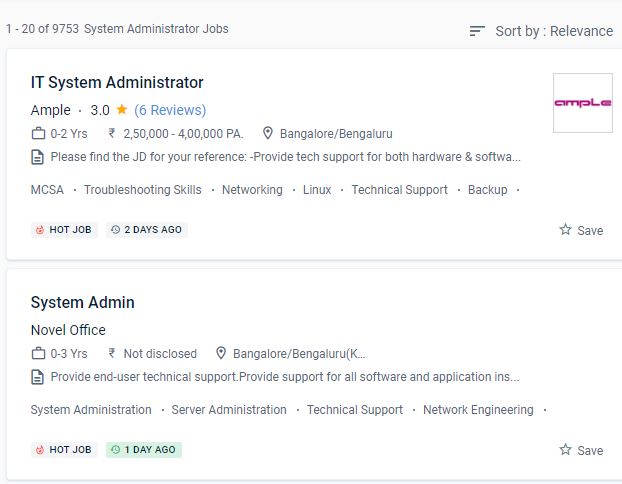System Administration Training by Experts
Our Training Process

System Administration - Syllabus, Fees & Duration
MODULE 1
- System administration introduction, policies, overview, UNIX history and basis
MODULE 2
- File systems and disks
MODULE 3
- Software installation concepts
MODULE 4
- Multi users basics, politics, policies and ethics
MODULE 5
- Automating administrative tasks
MODULE 6
- Networking
MODULE 7
- Backup and disaster recovery
MODULE 8
- DNS
MODULE 9
- SMTP, HTTP
MODULE 10
- Configuration management
MODULE 11
- Distributed computing
MODULE 12
- SNMP, monitoring
MODULE 13
- System security
This syllabus is not final and can be customized as per needs/updates





 Large companies provide opportunities for system admins to advance through promotions.
They set up the network card (NIC) so that data can be sent and received appropriately. Network architects have frequently experienced administrators who build data transmission systems from the ground up.
They are IT-savvy and can troubleshoot any technical issues that are causing the system to malfunction. Students who pursue a diploma in this field have a fantastic opportunity to expand their expertise. Finally, you'll discover how to restore your company's IT infrastructure following a disaster.
For secure, high-speed Internet access, they connect routers, modems, and firewalls. This course will teach you about the infrastructure services that keep all businesses, big and small, running smoothly. Computer scientists research to develop new IT approaches that are both effective and efficient.
To digitally connect clusters of computers, they create local area networks (LANs) and wide-area networks (WANs).
Large companies provide opportunities for system admins to advance through promotions.
They set up the network card (NIC) so that data can be sent and received appropriately. Network architects have frequently experienced administrators who build data transmission systems from the ground up.
They are IT-savvy and can troubleshoot any technical issues that are causing the system to malfunction. Students who pursue a diploma in this field have a fantastic opportunity to expand their expertise. Finally, you'll discover how to restore your company's IT infrastructure following a disaster.
For secure, high-speed Internet access, they connect routers, modems, and firewalls. This course will teach you about the infrastructure services that keep all businesses, big and small, running smoothly. Computer scientists research to develop new IT approaches that are both effective and efficient.
To digitally connect clusters of computers, they create local area networks (LANs) and wide-area networks (WANs).



















































































